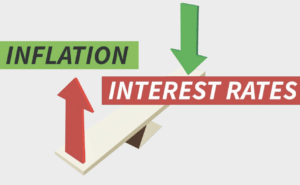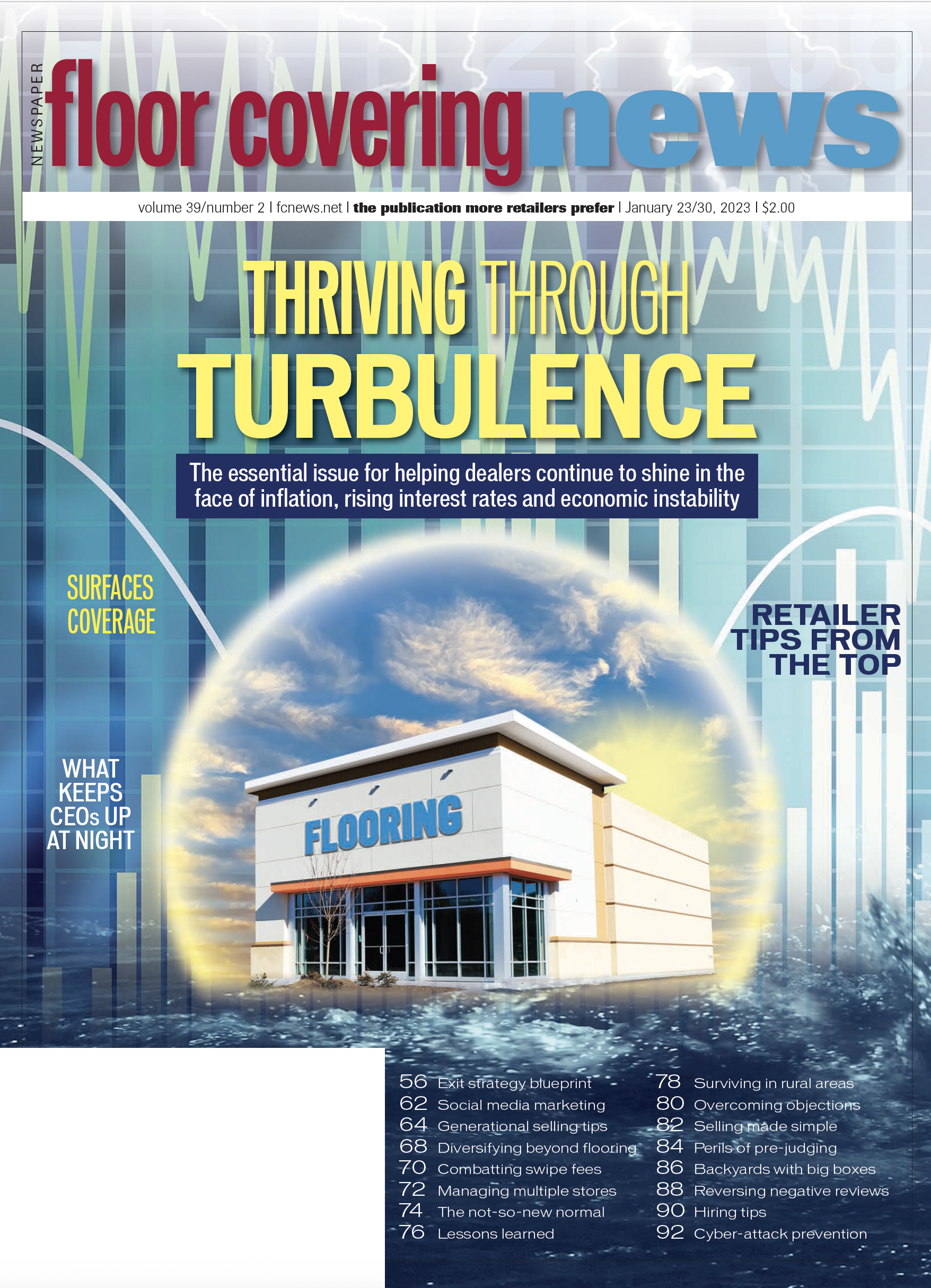 The higher inflationary/higher interest rate environment that we find ourselves in today is a challenge for small business owners like flooring retailers. Costs keep rising because of ongoing supply chain issues and labor shortages. To tamp down 40-year-high inflation, the Fed implemented six interest rate hikes in 2022—including four straight increases by three-quarters of a percentage point.
The higher inflationary/higher interest rate environment that we find ourselves in today is a challenge for small business owners like flooring retailers. Costs keep rising because of ongoing supply chain issues and labor shortages. To tamp down 40-year-high inflation, the Fed implemented six interest rate hikes in 2022—including four straight increases by three-quarters of a percentage point.
For consumers, higher interest rates mean it’s more expensive to buy big-ticket items that are typically purchased with credit, such as homes, automobiles and, of course, flooring.
How does the near-term look? Fed policymakers plan to inflict more “pain” (their word) into the market with additional rate hikes that they forecast will push up the unemployment rate to 4.4% by the end of 2023—meaning roughly 1.2 million people could lose their jobs over the 15-month period.
In what seems like a “pick-your-poison” scenario, FCNews asked retailers their thoughts on what negatively impacts business more: inflation or interest rate hikes.
Following is a sampling of those who agreed to share their perspectives.
Inflation
Sam Roberts
Roberts Carpet and Flooring, Houston
“In the retail business, I think inflation is, by far, more damaging. The combination of declining purchasing power and the psychological effect—at least some of it subliminal changes consumer behavior. Since flooring is often a postponable purchase, it is likely to be more affected than many other categories for the consumer. With persistent high inflation, the choosing of less expensive options for many consumers is also to be expected.”
Mike Hayes
David’s Abbey Carpet, Knoxville, Tenn.
“Inflation affects the mainstream customer with every purchase. Less disposable income tightens the pocketbook.”
Bobby Merideth
Flooring America OKC, Oklahoma City
“Inflation is more detrimental to business. It is an upward cost adjustment on all products and services in the supply chain. The increases in these costs not only reduce the consumer’s disposable income but also increase both the product and service costs to the company, which in turn must be passed on to the consumer. An increase in the interest rate is, however, a response tool by the Federal Reserve to stymie the upward trajectory of inflation. An increase in interest rates will typically affect those who borrow money for purchase, whereas inflation impacts the cost of all goods and services [regardless of] the origin of the money.”
Kelby Frederick
My Flooring Texas, Houston
“Inflation has had a much bigger impact on our business than interest rate hikes. When consumers are paying more for every item in their daily lives, they start questioning their decision to make big-ticket purchases that can be postponed. Our industry does not do enough finance business for interest rate hikes to have a direct negative impact on our consumer like it does in automobiles and housing. We are expecting a short-term slowdown that should generate pent-up demand when the economy stabilizes to the point consumer confidence rebounds.”
Interest rate hikes
Phil Koufidakis
Baker Bros. Flooring, Phoenix
“If I had to pick one, I would say interest rate hikes are a bigger issue. Inflation tends to be a bigger problem for the lower end of the market, which is not the area we participate in. Interest rate hikes impact home movement and remaining funds after closing, which are more likely to affect flooring.”
Ted Gregerson
Abbey Carpet & Floor, Anniston, Ala.
“Interest rates by far. Higher interest rates cause people to not put purchases on their credit cards. It causes people to not be willing to use credit lines on their homes, whereas when interest rates are low people borrow money to do projects. People who have money sitting in the bank want to keep it there instead of spending it because now they’re making interest on it.”
Craig Phillips
The Flooring Edge, Akron, Ohio
“Interest rate hikes have not really affected us yet, but they soon will. Our new home builders are seeing a steep decline in sales that is now five to six months in a row with no improvement. We will feel this drop in new home sales in the second and third quarters of 2023 for sure. New home buyers that finance the purchase have seen their borrowing costs double while inflation prices have yet to retract. This has really hurt the builders in our area that work with customers who finance a bulk or all of the purchase.”
Josh Elder
Gainesville CarpetsPlus, Gainesville, Fla.
“Now that interest rates have increased, new home starts have begun to slow and homes are sitting on the market longer. Homeowners now have less money to invest in their homes for renovations and can’t afford to purchase a new one because of the new rates. I believe it has begun to slow both the residential remodel and new construction markets at a similar rate.”

